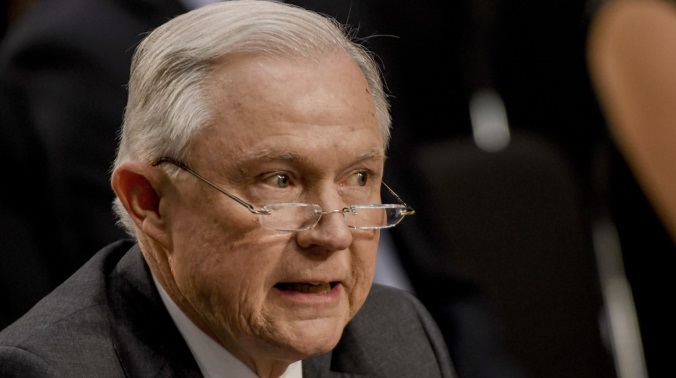In late July, Attorney General Jeff Sessions sent letters to the state governors of Colorado, Oregon, Washington and Alaska posing “serious questions” about each state’s marijuana regulations and enforcement. The letters sidestepped any real communication and instead used faulty, questionable, and incomplete data as a basis for his accusations. All four governors are pushing back, disputing these flawed findings with a flurry of facts that even Sessions can’t ignore.
Alaska’s Bill Walker Is the First to Respond
On August 14, Alaska Governor Bill Walker, along with his Attorney General Jahna Lindemuth, started the pushback against the allegations by pointing out mistakes in Sessions’ data gathering. In his letter to Alaska, Sessions used data from the 2015 State Trooper Annual Drug Report. However, Alaska’s regulatory framework was not enacted until 2016, so the allegations made with any data collected before that time don’t reflect the current environment in Alaska. Walker also brought up states’ rights to primary law enforcement. They state that the federal government is overstepping its bounds because “Alaskans voted to establish a regulated industry,” under the “exercise of traditional [state] police powers” within Alaska.
Washington’s Jay Inslee Joins the Response the Next Day
Dated the following day, Washington Governor Jay Inslee’s letter addressed similar concerns about inaccuracies from Sessions. In addition to failing to distinguish between legal and illegal marijuana activity within the state, Inslee pointed out that Sessions’ reference to the diversion of marijuana to “43 other states fails to acknowledge that this statistic covers several years before our recreational sales even began.”
Sessions also cited data from the March 2016 Northwest High Intensity Drug Trafficking Area (NW HIDTA) report, which, again, did not address the changes in legislation that took place and became effective in July 2016. Those changes already addressed the shared concerns between the federal and state agencies regarding regulation. The recently released 2017 NW HIDTA report made clear that:
“[A]s of July 1, 2016, the long-standing illegally operating dispensaries were shut down or became licensed retailers; sales are now subject to taxation, and medical marijuana products now must pass strict packaging and testing requirements before being sold to patients.”
Inslee’s letter also revealed statistics cited by Sessions that were grossly inflated:
“The statement ‘61.9% of drivers do not believe marijuana makes a difference in their driving ability’ (March 2016 report, at 82) is not supported by its source. The study in question surveyed 893 drivers and found that 97 of them reported having previously used marijuana within two hours of driving. Sixty out of those 97 (61.9%, but representing only 6.7% of all drivers in the survey) thought it did not make a difference in their driving ability. NW HIDTA chose not to include this statistic in its new 2017 report.”
Inslee also included a 16-page report on Marijuana Legalization in Washington State, outlining exactly how the Washington State Liquor and Cannabis Board regulates the marijuana industry in the state.
Oregon’s Kate Brown Responds the Following Week
In his letter to Oregon, Sessions not only mirrored the same unreliable research methods but used statistics from a draft report that had not even been completed. Oregon’s Governor Kate Brown addressed this in her letter dated August 22, 2017. She points out that:
“It is important to understand that this draft report does not (and frankly does not purport to), reflect the ‘on the ground’ reality in Oregon in 2017. This document was initially meant to provide a baseline understanding of the state of things related to marijuana in Oregon prior to legalization.”
When the report was used as a mere starting point as it was meant to, it became clear that initiatives such as “seed to sale” tracking, RFID tags and surveillance security systems, strict plant limitations, and public communications campaigns that have all been signed into law and enacted this year have successfully addressed all of the previous public health and safety concerns.
Colorado’s John Hickenlooper Is the Last to Respond
On August 24, Colorado Governor John Hickenlooper and Attorney General Cynthia Coffman penned their response to Sessions. They were quick to show that data used in Sessions’ allegations was unreliable and incorrect.
“We are familiar with the 2016 Rocky Mountain High Intensity Drug Trafficking Area (RMHIDTA) findings regarding increased marijuana-related traffic fatalities that are cited in your letter,” but, “RMHIDTA has noted that data collection gaps rendered pre-2012 data [used as a basis in the report] incomplete.”
They also hit home the fact that THC blood levels are detectable weeks after THC stops producing active effects, so the cited fatalities may not have been the result of marijuana impairment at all. Overall, most of the statistics cited can be reasonably disputed, are outdated, and deemed unreliable by the publishers of the reports themselves.
With this push for the truth from these four governors, it will be interesting to see how Sessions will choose to respond.

